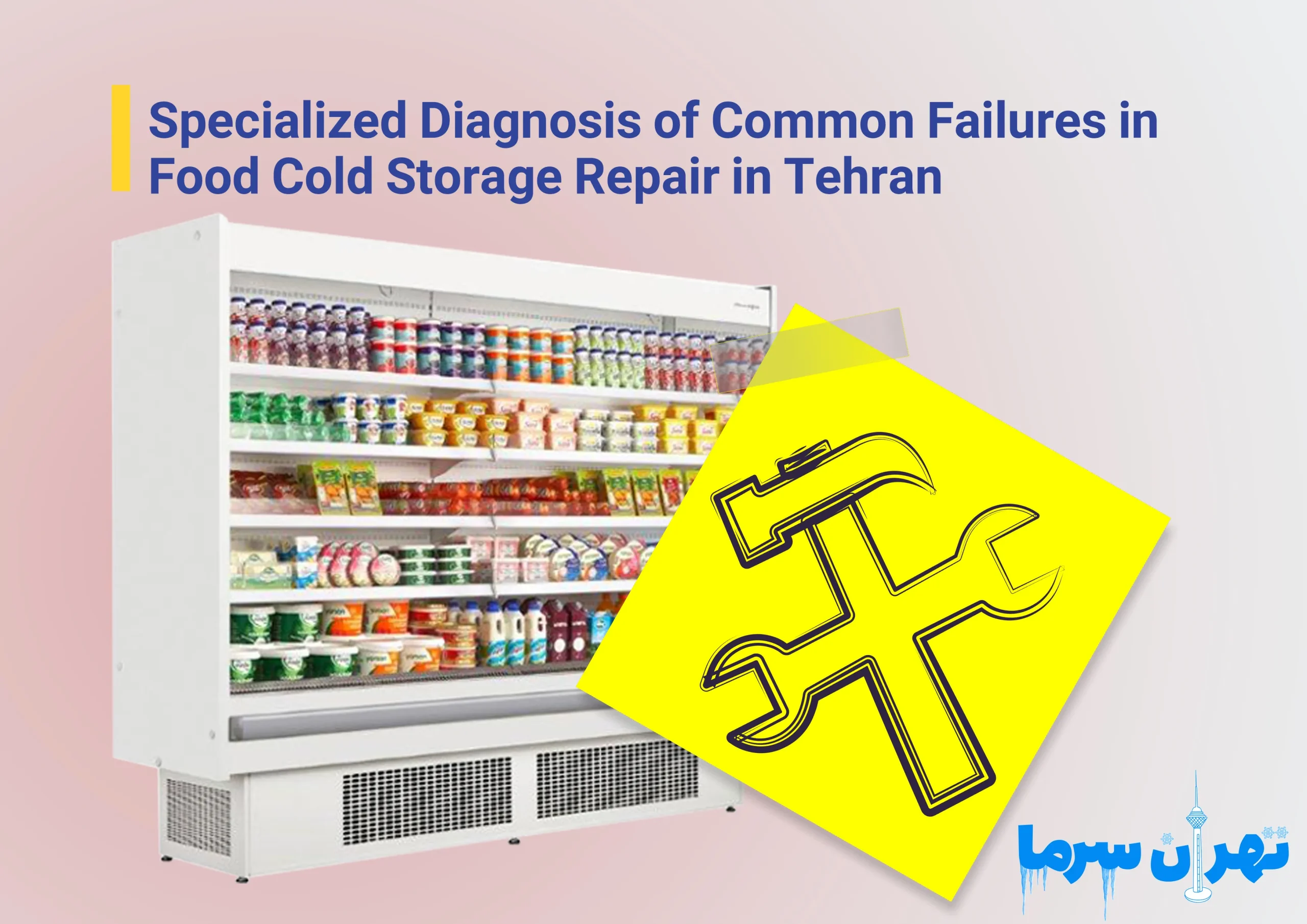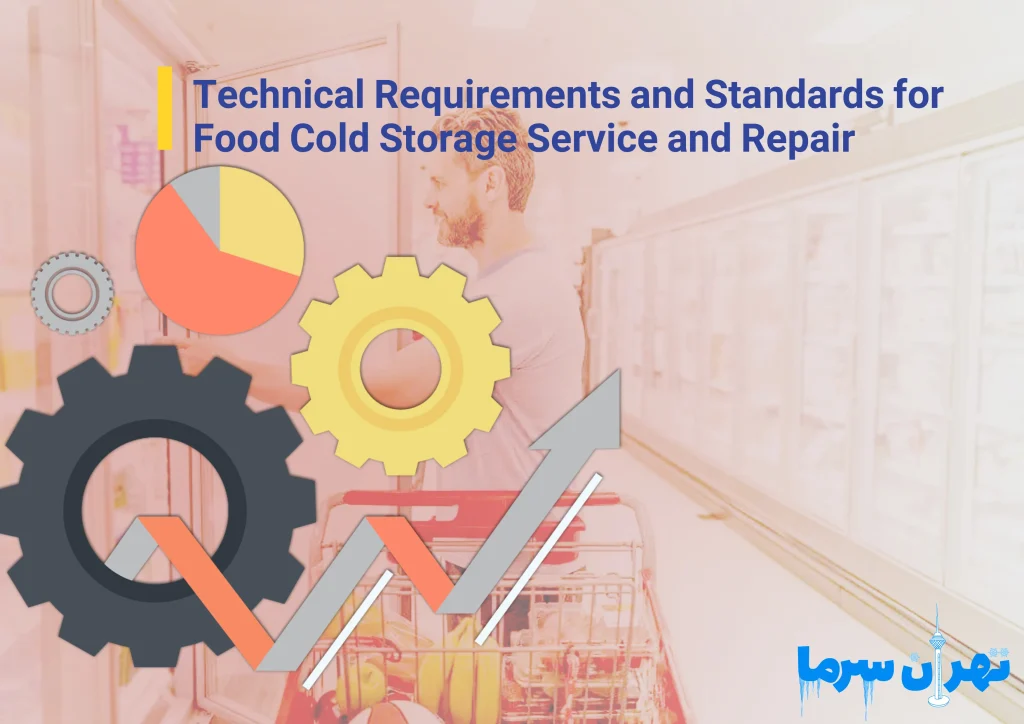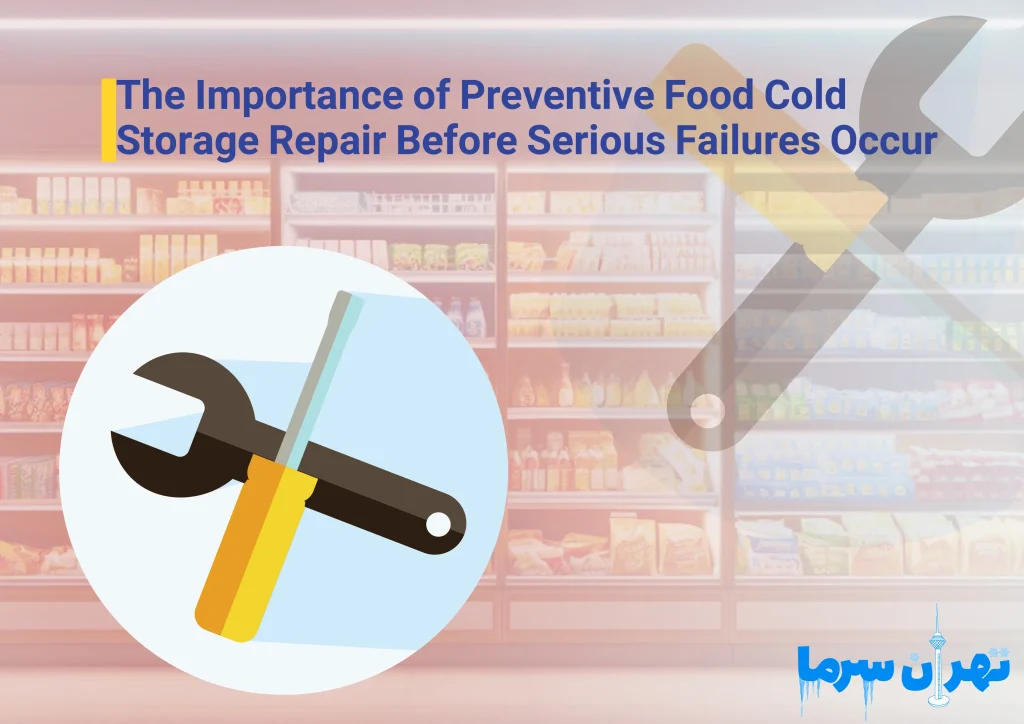Specialized Diagnosis of Common Failures in Food Cold Storage Repair in Tehran

Repairing food cold storage is a crucial action for maintaining the quality and safety of products stored at low temperatures. The service and repair of food cold storage involves regular inspection of components, temperature control, and ensuring the proper functioning of refrigeration systems. Cold storage repair in Tehran is particularly important due to the wide variety of storage centers and the need for proper maintenance of materials.
- The Importance of Proper Maintenance to Reduce the Need for Cold Storage Repair
Proper maintenance of food cold storage is a fundamental requirement in the food supply and distribution industry. In a city like Tehran, where the food supply chain is extensive and heavily reliant on refrigeration systems, even the smallest disruption in cold storage operation can lead to significant financial and health-related damages. Repairing food cold storage in this city depends not only on technical expertise but also on a deep understanding of specific climatic needs, operational conditions, and the type of stored materials.
Throughout the year, temperature fluctuations and environmental pollution in Tehran put additional pressure on refrigeration systems. Therefore, regular inspections of various cold storage components, such as compressors, condensers, evaporators, and control systems, become crucial.
In such conditions, food cold storage repair has become increasingly preventive. Instead of waiting for serious malfunctions, many food storage centers have defined periodic service programs to detect and address potential issues in their early stages. - Food Cold Storage Service and Repair and the Importance of Repair Time Management
In addition to technical matters, one of the major challenges in repairing food cold storage in Tehran is managing repair time. In many cases, these cold storages contain large quantities of perishable goods, and even the smallest delay in repair operations can result in spoilage of products.
This issue has made speed in diagnosis and problem-solving a key factor. Professional repair technicians and specialized companies, typically equipped with original spare parts and advanced tools, strive to resolve cold storage issues as quickly as possible.
Technological advancements in recent years have had a significant impact on the landscape of cold storage repairs. The use of smart monitoring systems, alert sensors, and refrigeration management software has enabled faster and more precise troubleshooting.
These tools help repair technicians predict potential issues and take necessary actions before major malfunctions occur. In Tehran, the adoption of these technologies in industrial and semi-industrial cold storage repair projects is on the rise, with many reputable centers now equipping their cold storages with these systems. - The Importance of Adhering to Health Standards in Food Cold Storage Repair in Tehran
It is also important to emphasize the significance of adhering to health and safety standards in the food cold storage repair process. Repair operations must be conducted in a manner that poses no threat to the safety of food products.
Using standard parts, maintaining hygienic practices in the repair environment, and providing ongoing training for technicians are key factors that ensure quality work. In Tehran, many reputable cold storage repair companies operate based on these principles and have successfully built customer trust.
Technical Requirements and Standards for Food Cold Storage Service and Repair
Food cold storage service and repair is a sensitive and precise process, where adhering to technical requirements plays a crucial role in maintaining the quality and safety of stored materials. Cold storages, as a fundamental part of the food supply chain, must operate at peak efficiency throughout the year, as even the smallest malfunction can lead to spoilage and substantial losses.
For this reason, standardizing service and repair methods has become especially important, and strictly following these standards is essential to avoid serious disruptions.
One of the key technical requirements in food cold storage service and repair is the periodic inspection of the refrigeration cycle and the condition of essential components such as compressors, condensers, evaporators, and control equipment. These inspections should be performed according to standard checklists by trained technicians. Additionally, controlling refrigerant levels and ensuring there are no leaks in the refrigeration circuit is vital, as a decrease in refrigerant levels can directly impact cooling efficiency and damage the compressor.
Adhering to international and national standards in cold storage repair is also a fundamental principle of this process. Standards such as ISO 22000 for food safety and regulations from the National Standards Organization of Iran define specific frameworks for maintaining and repairing refrigeration equipment.
These guidelines emphasize preventing food contamination during repair, using original and certified parts, and conducting functional tests after the repair operation. Following these standards ensures that cold storage continues to operate without risk after repairs.
Another important aspect of technical repair requirements is adhering to electrical and mechanical safety standards. Cold storage systems, due to their use of high-voltage electricity, high-pressure compressors, and chemical refrigerants, must be serviced with great care according to safety protocols. The use of specialized tools, proper insulation of wiring, and maintaining safe distances when working on refrigeration equipment are among the critical requirements that must be strictly followed.
From a managerial perspective, documenting the service and repair operations plays a vital role in improving service quality. Accurately recording the cold storage’s status before and after service, documenting technical parameters such as pressure, temperature, and refrigerant levels, and providing a complete report to the cold storage owner or manager are considered professional work requirements. This documentation not only aids in clarifying the repair process but also helps in analyzing the cold storage’s performance over time.
The Role of New Technologies in Improving Food Cold Storage Repair and Maintenance Processes
In recent years, new technologies have had a profound impact on the cold storage industry, particularly in the repair and maintenance process of food cold storages. With the increasing demand for higher quality in food storage and greater sensitivity towards energy consumption optimization, the use of technological tools has become an undeniable necessity.
Today, cold storage repair is no longer limited to replacing faulty parts; instead, with advanced technologies, potential problems can be identified before they cause failures, and more effective preventive measures can be taken.
One of the most prominent advancements in food cold storage repair is the use of smart monitoring systems. These systems, which involve the installation of precise sensors on various cold storage equipment, provide real-time data on temperature, pressure, energy consumption, and compressor performance.
The collected data is continuously analyzed, and any unusual fluctuations are immediately identified. This capability allows technical teams to inspect and repair equipment before serious malfunctions occur, minimizing cold storage downtime.
Advanced technologies have also enabled the use of predictive analysis algorithms. By leveraging these machine learning-based algorithms, it is possible to recognize patterns in equipment performance and predict potential failures. This type of prediction makes maintenance programs much more targeted, ensuring that repairs are only conducted when truly necessary, which leads to reduced costs and an extended lifespan for cold storage facilities.
In practical repair processes, new technologies have played a significant role. Accurate diagnostic tools, such as digital leak detectors, advanced thermographs, and wireless measuring equipment, have made troubleshooting faster and more precise. Technicians can identify the exact source of the issue without the need for extensive system dismantling, performing repairs with minimal damage to the cold storage structure.
Communication technologies have also brought positive changes to repair and maintenance. Today, many cold storage facilities are equipped with Internet of Things (IoT) systems, enabling remote control and monitoring.
Managers can assess cold storage performance without being physically present on-site and, if necessary, communicate with technicians or even execute preliminary repair instructions remotely. This level of access and control is particularly important in a large city like Tehran, where quick access to facilities can be challenging.
It is important to note that new technologies have not only improved the cold storage repair process but have also changed the overall approach to cold storage maintenance. Maintenance is no longer about waiting for a failure to occur and then repairing it; instead, it has become a dynamic, continuous, and data-driven process. This shift in mindset has led to reduced operational costs, increased food safety, and significantly extended the useful life of refrigeration equipment.
Challenges and Solutions for Managing Emergency Food Cold Storage Repairs
New technologies play a crucial role in improving the food cold storage repair process. The use of smart monitoring systems, advanced sensors, and accurate diagnostic tools enables the rapid identification of issues before major failures occur, reducing cold storage downtime.
Moreover, by utilizing predictive analysis and machine learning algorithms, failures can be anticipated, and repairs can be carried out in a targeted and scheduled manner. These innovations not only help increase efficiency and reduce costs but also contribute to a longer lifespan for equipment and better maintenance of food products.
The Importance of Preventive Food Cold Storage Repair Before Serious Failures Occur
Preventive food cold storage repair before serious failures occur is of paramount importance, as preventing sudden breakdowns can significantly reduce emergency repair costs and extend equipment lifespan.
Periodic maintenance and servicing help in the early identification of issues such as refrigerant leaks, compressor malfunctions, or a decrease in refrigeration system efficiency, which, if ignored, can lead to widespread damage and spoilage of stored food. Thus, preventive repairs are not only cost-effective but also ensure the safety and quality of food, preventing premature spoilage.
?Why Choose Tehran Sarma Engineering for Food Cold Storage Repairs
Choosing Tehran Sarma Engineering for food cold storage repairs is a smart decision, as the company offers extensive expertise and experience in refrigeration system maintenance and repair, providing technical and engineering services of the highest standards.
Tehran Sarma’s technical team, equipped with advanced tools and up-to-date knowledge, is capable of quickly and accurately diagnosing refrigeration system issues, preventing major and costly failures by carrying out timely and preventive repairs. Additionally, the company offers specialized consultations and repair services in compliance with health and safety regulations, ensuring optimal cold storage performance and the best preservation of food products.
For more information about cold storage construction prices, you can visit Tehran Sarma’s website and contact us at 09121906418 or 02177972256.
Food cold storage repair is essential to prevent refrigeration system failures and reduce food waste. Service and repair tasks include checking refrigerant gas, insulation, and compressor health, all of which play an important role in extending equipment life. Cold storage repair in Tehran, given the large number of food production, distribution, and storage units, requires adherence to technical standards and adequate expertise.
Source:
https://unitedinsulated.com/




 سردخانه
سردخانه برق
برق کمپرسور
کمپرسور کمپرسور بیتزر
کمپرسور بیتزر کمپرسور کوپلند
کمپرسور کوپلند کمپرسور بوک
کمپرسور بوک کمپرسور دانفوس
کمپرسور دانفوس کمپرسور منیروپ دانفوس
کمپرسور منیروپ دانفوس کمپرسور امبراکو
کمپرسور امبراکو کمپرسور پاناسونیک
کمپرسور پاناسونیک کمپرسور سابکول
کمپرسور سابکول کمپرسور کوپلند
کمپرسور کوپلند کمپرسور اسکرال کوپلند
کمپرسور اسکرال کوپلند کمپرسورفراسکلد
کمپرسورفراسکلد کمپرسور رفکامپ
کمپرسور رفکامپ کمپرسور اسکرال دانفوس
کمپرسور اسکرال دانفوس گاز مبرد
گاز مبرد گاز R22
گاز R22 گاز R134
گاز R134 گاز R404
گاز R404 گاز R407
گاز R407 گاز R410
گاز R410 گاز R508
گاز R508 کندانسور هوایی
کندانسور هوایی اواپراتور
اواپراتور اواپراتور آرشه
اواپراتور آرشه اواپراتور صابکول
اواپراتور صابکول اواپراتور آسه
اواپراتور آسه اواپراتور نیک
اواپراتور نیک اواپراتور آرتک
اواپراتور آرتک اواپراتور نوین
اواپراتور نوین اواپراتور تبادل کار
اواپراتور تبادل کار درب
درب ساندویچ پنل
ساندویچ پنل فن سردخانه
فن سردخانه روغن کمپرسور سانیسو
روغن کمپرسور سانیسو متعلقات سردخانه
متعلقات سردخانه